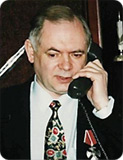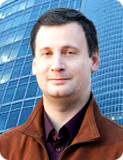Man on the way towards «Cosmic Consciousness»Have you admired endless miraculous sky, pulsing with cold «cosmic» lights from faraway? Such admiration is endless itself. But afterwards, after this admiration of unearthly beauty and might, didn’t you think: who are you in the endless Universe? Where are the limits of your capabilities and boundaries of your knowledge? Questions, questions, which for centuries worried brightest minds and ordinary people, from the «kindergarten» age of humankind... Two and a half thousand years ago at several points on Earth certain events happened in the places of birth of ancient civilizations. Vladimir I. Vernadsky (Russian philosopher and scientist) called this «burst of creativity», while German philosopher K.Yaspers called named it Axial Time, Axial for all humankind. This was axial time because man found his own intellect and personality, and his indissociable connection to Cosmos. Each of the sources of human civilization had elaborated various — in form and consideration — attitudes to this connection. Ancient India. All locally originated philosophic systems have such definitions as «karma», «reincarnation». According to the ancient Indian philosophers, Universe is materialization of genuine real One, and human soul is part of this Eternal and Perfect One. Man’s goal is to hold the equilibrium between earthly and unseen worlds, streaming to inner perfection in this life. Man in ancient China was taken in natural and social environment. Chinese philosophers did not believe in reincarnation and took death as evil. And tried to keep away from other worldly things; but worshipped the dead.. Chinese philosophers gave more attention to social and ethical problems. They postulated ideas of entity of Nature and human laws, and Non-resistance towards natural stream of events. Ancient Greece in Pre-Socratic period explained interconnection of man and Nature Cosmo centrically. Cosmos was handled as living being, which consisted of some unseen somatic substance. Cosmos, society and a man, according to Pre-Socratics, were subordinated to the same laws, which were considered intelligible. The next step was achieved by Plato, disciple of Socrates. His philosophy combined cosmological doctrines of the ancient world, not only Greek, but oriental as well. According to Plato, the Lord-Creator (basing on ideal perfect sample) made beautiful proportional living Universe, which has the cosmic soul. Man is created by the children of Creator, gods of 2nd level, so the man is not equal to Creator of the world, but is made in semblance of the Universe. After that Cosmos and man go their own ways — life and death features depending only on themselves. Learning the nature of the Universe, man get highest present from the gods — philosophy. And if he studies with love and devotion, striving to really intelligent, then touching the truth he could get immortality as much as human nature could hold, so as much as suggested by the Lord. The Universe gives an example of how to train and care one’s body, running from idleness and seeking equilibrium, between inner and outer movements. It is not easy to follow thoughts of the ancient philosophers without special training, while about 2500 years passed (Plato lived about But assonance of Plato’s ideas with modern challenges is clear to non-philosophers as well. Humankind — former disengaged, now integrated whole — entered cosmic space and started its practical mastering. Re-thinking of the old philosophic problem — interrelation of man and the world, man and Cosmos — is on the agenda again; the same problem as in Plato’s time, now on the basis of thousand years materials, huge scientific experience, in changed social and historical situation. This succession and tradition is not for nothing, they reflect inner pulse of philosophic thoughts, figuratively speaking — acknowledgment of the experience of the consciousness. Famous Russian thinker Vladimir I. Vernadsky in 1886 has confirmed observation that the thought, being expressed once, would live in the thoughts of the followers: «When you work on the scientific problem, images of many persons appear in your mind, those who had earlier thought about the same; and you feel unknown, unseen chain, which connects you with Greek philosopher, medieval monk, Arabian doctor or one of the great scholars of the last three centuries. They were solving the same problem, they thought, and at each step you can see evidences of their work, and you continue their thoughts, forming continuity of work...» Plato’s ideas were developed in a very original way by Russian cosmists — Konstantin E. Tsyolkovsky and N.F.Fedorov in the end of XIX — beginning of XX century. They took many approaches from Plato. First, postulate of genetic entity of man and Cosmos; second, belief in probability of leaning of Cosmos; third, idea of harmonic coexistence of Cosmos and man; forth, belief that created by the Lord is not a play, but necessity; fifth, belief that it depends on a man, would he acknowledge prototype of creation of himself and Cosmos; sixths, assurance that cognition of Cosmos as first copy of the perfect sample is a step towards learning the heart of the matter. Russian cosmists predicted future. They anticipated dramatic change, observed by modern generations: change of the scale of creative work, globalization of social processes, required for further evolution of the humankind. According to cosmists, new step of evolution supposed activity of human society. Further development of Cosmos itself and humankind depends on creative activity of people, their ability to cooperate, undergo war and quarrels, and influence natural and historical processes. Let’s look at the thoughts of Vladimir I. Vernadsky more; he was thinker, first of all, representative of Russian cosmists. He combined philosophical and scientific knowledge and created modern scientific worldview, and invented life in the structural classification of Cosmos. Phenomenon of dissymmetry of the living organisms (principle of Curie-Pasteur) was for him one of the main arguments, proving universal cosmic origin of life. Main molecules, produced by the organisms and related to them, do not have center and plane of symmetry. Proteins, lipids and hydrocarbons are dissymmetric. While in Cosmos there is no such molecular dissymmetry observed (no dissymmetry in nonliving, ossified material). According to Vernadsky, such difference between living and nonliving material occurs due to the influence of dissymmetric cosmic forces on the living substance. Vernadsky had an interesting view on the problem of the origin of life on Earth. He considered that biological life is dispersed in the Universe, while spores of living being were brought to Earth from outside; for him this appeared evidence of cosmic origin of life. He based on the fact of dispersion of thermophylic bacteria at the Northern pole. Swedish scholar S.Arrenius supposed these bacteria citizens of Venus, according to their lifecycle and optimal characteristics. Optimism of life existence at the other planets is not proved yet. But the opposite is not proved as well. During «Viking» project Scientists have another fact. In 1984 meteorite «Allen Hills»-84001 was found in Antarctic ices, which came from Mars. Investigation of it sowed 5 evidences of possible former existence of life on the red planet. Microscopic unicellular organisms were found, similar to bacteria on Earth. Also in the structure of meteorite there were molecules of polycyclic hydrocarbons, supposedly formed as a result of life process of microorganisms. As soon as the meteorite is on earth 13 thousand years, and age of microorganisms is approximately 15 million years, some scientists see evidence of panspermia theory, bringing of spores of living beings to Earth. Problem of connection of Cosmos and man is solved by Vernadsky with orientation to their spiritual and material organic entity. As man appearance on Earth, new step of biosphere development started, and biosphere turned to Noosphere [Antropospere] — entity of intellect and culture, created by man. At the end of the day Vernadsky supposed that humankind would enter Cosmos. Second half of XX century has proved this in complete. Nowadays we are evidents of renaissance of «cosmic philosophy». Humankind is staying before necessity of solving global problems (social, ecological, military defense) is close to learning of cosmic worldview and worldfeeling.Humankind is seeking those principles of world perception, which will help to survive in the difficult and controversial world. Former worldview is like Earth-galley, floating in the infinite ocean of the Universe, where everyone on board is enchained by profit, egoism, envy and evil. New worldview is Earth-boat with free fishermen crew. The old worldview has to be changed. You are not able to leave the boat, but on board of Earth-boat there are free people, clean in their thoughts, mighty in their spirit, united by high and sensible goal. Now is the step in development of civilization, when ideas of harmony and entity must dominate in the consciousness of each man, and form way of thinking, which could be called «cosmic consciousness». Elaborating of the new worldview was not easy. It required rejection of many dogmas and accepting of certain axiomatic assumptions. Here are some of them:
Elaborating of the «cosmic consciousness» became an object of investigation of many sciences, including two which could be first heard about — Noocosmology and Anthropophenomenology. His is easy to explain, as these are new disciples: definitions are formed, laws are being formulated... I am one having direct relation to establishing of new sciences, and I am sure that there will be further steps, I believe in future of these sciences. And so I suppose that it would be interesting for readers to find more, at least in general. So Noocosmology is new complex science, which combines achievements of many social and natural sciences. It investigates wide entity of fundamental laws of human and cosmic interconnection, target mastering of Earth regions during modern change of biosphere, learning of processes of keeping and developing of health of humankind. It is obvious that the tasks are connected with development problems of the social potential and activation of human factor. Recently new direction is formed — anthropophenomenology — which combines scientific disciples, devoted to the problems of opening of psychic and physiological resources of man, development of abilities and reaching highest level, investigation of the spiritual part of humankind as the general for evolution of our civilization. Attempts to show borders of the new worldview demonstrate general tendency, related to cosmic view of modern man and harmony. This tendency to harmony is observed as universal [from Universe]. We have to remember that Russian cosmism gave important ethic aspect to this worldview, connected infinity of learning with ethic taboos of destruction of natural and spiritual worlds. This is the most important contribution, done by our compatriots, for world scientific, philosophical and practical culture; which is deeply connected to many aspects of the perspectives of planetary survival. Keep reference to the original resource https://noocosmology.com/article/man_on_the_way_towards_cosmic_consciousness.html |

Man on the way towards «Cosmic Consciousness» Structure of spiritual Hierarchy in Metasocmos Spirits, soul and consciousness What physicists observed behind the exotic phenomenon Glamour and Emptiness of our world About soul organization, choice and spiritual development Some problems of modern science Antimatter and perfecting of the soul Higgs boson and questions of modern physics Security in the modern world: problems and tasks What is hidden under the cover of apparentness in mathematics and in the usual world around us How modern people understand the world, roots of this understanding and related problems of life 

|
|
All rights reserved and are protected by law © 2012 Internet portal «Noocosmology»
For using these materials, hyperlink is obligatory.
|







